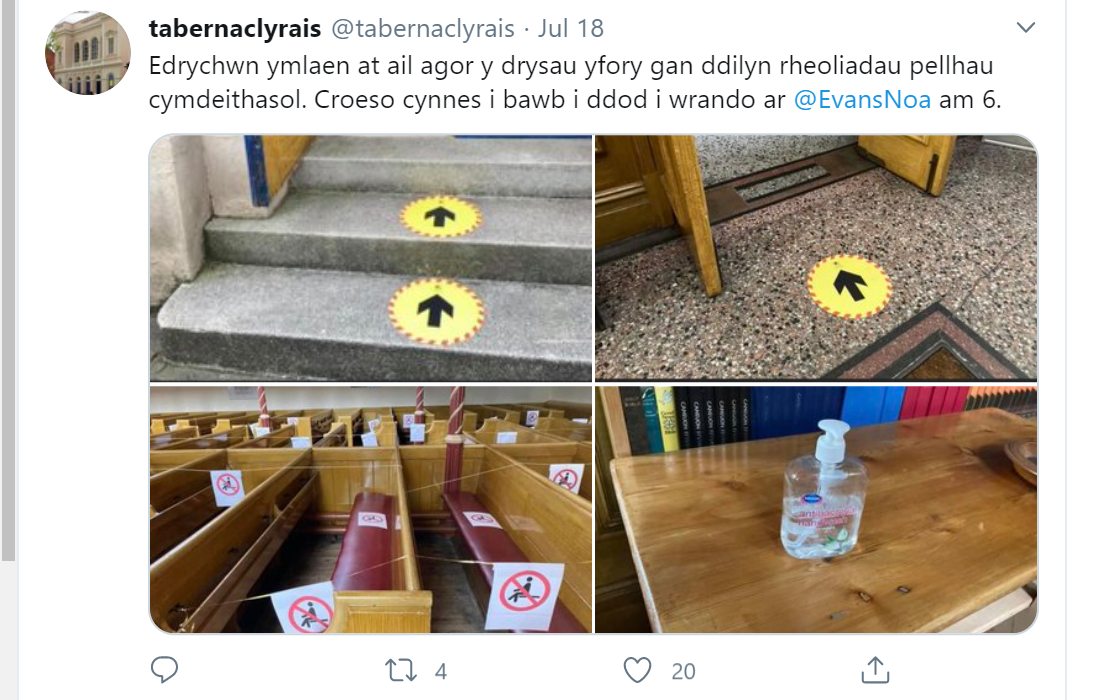GRADUAL REOPENING OF PLACES OF WORSHIP
Very gradually, places of worship in Wales are starting to re-open, with meticulous safety precautions in place. This re-opening is happening in accordance with the regulations and guidance promulgated by Welsh Government, which is regularly updated. You can read a summary of the current guidance on Cytûn’s dedicated webpage, which is updated regularly.

In a letter to the Faith Communities Forum (which includes Cytûn and many other religious bodies in Wales) on June 25, Deputy Minister in the Welsh Government, Jane Hutt MS, wrote:
The support and leadership you have continued to demonstrate to our communities across Wales … has been truly exceptional. I wish to put on record my thanks and let you know how much that is appreciated.
Not being able to access places of worship has been difficult for so many people and there have been many significant events, prayers, religious festivals and ceremonies that have either not been held at all or have had to be undertaken in very different ways.
The recent movement out of lockdown in beginning to re-open places of worship, where it is safe to do so, would not have happened so successfully without your help, advice and insights. … I, and my officials, hugely welcome and appreciate your agreement to continue this engagement as we progress through the easing of the lockdown measures and consider how we could enable other ceremonies and rituals to recommence, and do so safely. We really do have something very special in Wales in the way we all work so successfully across faiths, beliefs and communities. The work you do together across faith communities and with the Welsh Government clearly demonstrates how working effectively together can benefit all of our communities.
Meanwhile, churches have continued their work in other ways. On August 14 the First Minister, Mark Drakeford MS, went to St Thomas’s Church in Caerffili to see the CARE Project (Church Assistance Request in an Emergency), set up in March to deliver food parcels, shopping and prescriptions, as well as offering emotional support to anyone in the CF83 postcode needing some extra help. Since then, over 100 volunteers – from teenagers to pensioners – have taken thousands of phone calls and delivered thousands of food parcels, helping hundreds of people.
First Minister Mark Drakeford said: “Though the coronavirus pandemic has been a difficult time for us all, our volunteers in Wales have shown themselves to be a light in the dark. The CARE project is an impressive endeavour made up of selfless people who responded promptly and with warm hearts, despite trying circumstances.”
The Reverend Dean Aaron Roberts said: “This visit has been a huge morale boost for our entire 100 volunteer strong workforce … We have received incredible support from the local area with donations of money and food, but also of time and energy to ensure people are looked after. Our charity will now prioritise looking at building resilience in our communities and continuing to offer practical assistance as we adjust our lives to the new normality we are about to discover as the nation seeks to recover from lockdown.
DEVOLUTION AND THE UK INTERNAL MARKET
When some member denominations of Cytûn called for the formation of an inter-denominational Working Party on Wales and Europe following the referendum in June 2016, one of the issues on the agenda from the beginning was the possible effects of exiting the EU on devolution to Wales. What would happen to the responsibilities which would return from the EU to the nations of the UK following our departure?

This transfer of powers will now happen at the end of the transition period on 31 December 2020. In the light of this, the UK Government published in July a White Paper on the UK Internal Market and how regulation of that market would work in future. The UK Government intends to do this by legislating for two principles (which are currently found in the EU Single Market):
Welsh Government and Senedd committees have expressed great concern about the implications of these proposals, if these principles are not balanced by other principles such as subsidiarity (that decisions should be made at the most local level possible) and a system of discussion and co-operation between governments. The Counsel General in the Welsh Government, Jeremy Miles MS, has written to Alok Sharma, Secretary of State for Business in the UK Government, saying:: Our reading of the proposals is that the proposed legislation would prevent the Senedd or Welsh Ministers from imposing mandatory requirements relating to lawful sale of goods and services in Wales – even where there were justified by public health objectives, environmental concerns or any other public policy reason. This would represent a direct attack on the current model of devolution.
Cytûn contributed to a response to the short (4 week) consultation on the White Paper co-ordinated by the Wales Civil Society Forum on Brexit, of which we are members, and on August 24 the Wales and Europe Working Party of Cytûn received a briefing about that response. Amongst the concerns are:
The Working Party agreed that we would continue to work with the Forum as the Bill is published, and that we would respond to the current consultation by a Senedd committee on preparedness in Wales for the end of the transition period. We would be glad to hear from readers who would like to contribute to this response – please contact gethin@cytun.cymru by September 30.
Bishop urges European citizens to apply for Settled Status immediately
The Wales & Europe Working Party of Cytûn warmly endorse this appeal.
With less than a year remaining before the UK Government’s deadline for EU, EEA and Swiss citizens living in the UK to apply for Settled Status, a bishop who has gone through the process is urging people not to delay in making their application. Bishop William Kenney, Catholic auxiliary Bishop of Birmingham and himself a Swedish national, says those who are eligible should apply well ahead of 30 June 2021. You can hear him explain more here: https://tinyurl.com/y4frzb5w
The government requires European citizens who have made their homes in the UK to make an application or risk losing their fundamental rights to live and work here. Everyone including the children and partners of European citizens need to do this. Bishop Kenney warned that while many people have found it straightforward, others have faced obstacles navigating the system or don’t even realise they’re required to apply. He’s therefore urging people to get their applications in early and encouraging parishioners to look out for others who might need some support.
European citizens in Wales can access free support at http://www.eusswales.com/en/index.html The organisation Settled also offers support in a range of European languages.
HEALTH SURCHARGE FOR OVERSEAS VOLUNTEERS?
The UK’s new post-Brexit points-based immigration system is being introduced at Westminster by the Immigration and Social Security Co-ordination (EU Withdrawal) Bill. The UK Government’s Command Paper (CP 258) appears to confirm that those seeking to apply to work in the UK as international volunteers will be liable to pay the Immigration Health Surcharge. This will be a significant amount of money (rising to £624 per year on 1 October 2020 for most visas).
Baroness Jolly, a Liberal Democrat Peer, has tabled an amendment to the Bill on behalf of Camphill Scotland, the Wales Council for Voluntary Action and equivalents in Northern Ireland and Scotland, and other organisations who believe that this will have an adverse impact on the ability of charities to recruit international volunteers. Churches and other organisations can sign up to support this amendment by contacting Robert McGeachy, Policy and Engagement Manager at Camphill Scotland on 07825-149005 or Robert@camphillscotland.org.uk
FORTHCOMING WELSH LEGISLATION
On July 15, First Minister Mark Drakeford MS announced the Welsh Government’s legislative programme for the remainder of this Senedd term (ending prior to the elections on May 6 2021). The pandemic has meant abandoning, at least until after the election, legislation relating to bus services, educating children at home, tertiary education and research and “social partnership”, although some of these have been or will be published in draft.
As well as the Curriculum and Assessment Bill (pp 4-5), the Government hopes to complete:
- The Local Government and Elections (Wales) Bill which would enable 16 and 17 year olds to vote in local elections, provide a legal basis for regional co-operation between local authorities, and introduce self-assessment and peer review for local authorities.
- The Renting Homes (Amendment) (Wales) Bill, which extends the minimum notice period for tenants in the private rented housing sector to six months.
- A heavy programme of secondary legislation relating to exiting the European Union and Covid-19, and the budget for 2020-21, which has been greatly affected by Brexit and Covid.
- A number of other items of secondary legislation, relating to (for example) extending the ban on smoking to more outdoor areas and workplaces; controlling agricultural pollution; banning third party sales of puppies and kittens; and an Additional Learning Needs code.
- Interim measures, where full legislation is not now possible, regarding (for example) registering teachers in independent schools and introducing more 20mph speed limits.
WALES’ NEW SCHOOLS CURRICULUM BILL

On 6 July 2020, Welsh Government published the Curriculum and Assessment (Wales) Bill, together with a suite of background documents. The Bill is intended to provide the legal underpinning for the new Curriculum for Wales, published in January 2020for introduction in schools from September 2022. The Government is still currently intending that introduction begin in 2022, although in evidence to a Senedd Committee on July 14, the Education Minister, Kirsty Williams MS, indicated that she has not ruled out a delay due to the disruption caused by Covid-19.
The Children, Young People and Education Committee of the Senedd (Welsh Parliament) is currently scrutinising the Bill, and will compile a report offering their comments and possible amendments to the Bill by December 4 2020. The Committee is inviting written submissions from the public until September 29 2020. The Committee has also published a survey for children and young people. Responses to the survey are required by September 13.
Cytûn published a briefing on the curriculum documentation earlier this year, and this can be accessed on the Cytûn website. A key change is that each school will draw up its own curriculum, within the constraints outlined in the Bill, such that it must cover the six designated Areas of Learning and Experience, which are: Expressive Arts; Health and Well-being; Humanities; Languages, Literacy and Communication; Mathematics and Numeracy; Science and Technology.
Relationships and Sexuality Education (RSE) will become mandatory for all pupils as part of the Health and Well-Being Area of Learning and Experience. Clause 24(2) of the Bill requires that the provision in this subject must be developmentally appropriate for pupils. This part of the curriculum will be subject to much greater specification than other areas, rather than being largely locally determined. Welsh Government has published an initial introduction to the method of drawing up the RSE syllabus of a school. The Faith/BAME Involvement Group, of which CytÛni is part, has expressed some concern about the absence of fundamental topics such as friendship, family, partnership and marriage from this outline and is awaiting an opportunity to input into the more detailed draft national level guidance which will follow.
Under the Bill, Religious Education will be renamed Religion, Values and Ethics (RVE) and will form part of the Humanities Area of Learning and Experience. There will be a complex process – contained in Schedules 1 and 2 of the Bill – regarding the drawing up of each school’s curriculum for Religion, Values and Ethics:
- “such non-religious philosophical convictions … as, in the opinion of the authority, ought to be represented”;
– A committee representing the Local Education Authority;
– A committee of representatives of teachers’ organisations.
The four committees must all agree in order to adopt a syllabus; if they are unable to agree, Welsh Government shall appoint a body of persons appearing to the Welsh Ministers to possess relevant experience to prepare a syllabus of Religion, Values and Ethics.
Community schools and foundation and voluntary schools without a religious character: These schools will design their curriculum for Religion, Values and Ethics (RVE) having regard to the locally agreed syllabus.
Foundation and voluntary controlled schools which have a religious character (VC schools): These schools will need to make provision for denominational RVE and also RVE having regard to the agreed syllabus. The default arrangement for these schools will be for learners to receive RVE designed having regard to the agreed syllabus, but RVE that accords with the school’s trust deed or faith tenets (denominational RVE) must be provided where a parent requests this. (This is a change from the current situation, where a VC school needs only to consider a request for denominational provision).
Voluntary aided schools which have a religious character (VA Schools): These schools will need to make provision for denominational RVE and also RVE that accords with the agreed syllabus. The default arrangement for these schools will be for learners to receive RVE that accords with the trust deeds or faith tenets of the school (denominational RVE). However, if a parent requests RVE that accords with the agreed syllabus, it must be provided. (This is a change from the current situation, where a VA school need only consider a request for provision that accords with the agreed syllabus).
Note that in the case of a VA school, the provision must accord with the agreed syllabus, rather than be designed having regard to the agreed syllabus. These will be the only schools required to teach RVE that accords with the locally agreed syllabus.
These changes in the position of VA schools with regard to Religion, Values and Ethics have caused considerable concern on the part of the Catholic Church and the Church in Wales – the only two religious bodies which currently provide schools of this kind in Wales.
The Senedd Committee has written to the Education Minister asking a number of questions about RVE and she has replied. This correspondence, along with other parliamentary documents relating to the Bill, can be seen here. We would urge all member churches and organisations of Cytûn to consider responding to the Senedd Committee consultation to express their views.
More importantly, however, is that this is the time for local churches to begin to consider how they wish to engage with their local schools, and how they might respond to approaches from local schools, as we have much to offer to enrich this new curriculum in pupils’ cynefin.
WORKING AND PRAYING FOR CREATION

May God who established the dance of creation, who marvelled at the lilies of the field, who transforms chaos to order, lead us to transform our lives and the Church to reflect God’s glory in creation.
Cytûn is inviting all churches to hold a local Climate Sunday between September 6 2020 and September 5 2021, as the UK prepares to welcome the crucial COP26 climate conference to Glasgow in November 2021. Worship material, including a complete order of service, is on Cytûn’s website – https://www.cytun.co.uk/hafan/en/climate-sunday/ – and links to a host of additional resources are on https://www.climatesunday.org/ And there is much more to come in the next few weeks!
HOUSING JUSTICE CYMRU: CITADEL PROJECT

The word citadel means a ‘fortress ‘or ‘stronghold’ typically one on high ground. Our inspiration was taken from the following verse: The LORD is my rock and my fortress and my deliverer, my God, my rock, in whom I take refuge, my shield, and the horn of my salvation, my stronghold – Psalm 18:2.
The aim of Citadel project in Wales is to help people to find a stronghold within themselves, to build resilience so that they are less likely to end up homeless and can maintain their tenancy. Citadel does this by training volunteers to work with individuals, using a strength based approach to help people identify what matters to them and achieve it.
Citadel uses a ‘Circles of Support’ model, to build a network of support for individuals, including any agencies already involved and other agencies who may be of benefit to the individual. Citadel Volunteers would meet with individuals on a regular basis (in a public place, e.g. a café) over a period of 3-6 months to begin with and would receive supervision with the Citadel Co-ordinator once a month to ensure that each pairing is successful.
Citadel was developed as we identified a gap and need for this support model. We know that around 90% of people who have experienced homelessness in the last five years are still worried about their housing situation, which tells us that there is a huge need for ongoing support despite the services that already exist.
You can see a short film about Citadel here: https://youtu.be/J-ZiQ5_VAjU
Bonnie Navarra, Director, Housing Justice Cymru
The latest Housing Justice Cymru newsletter, from which this story is extracted, has been circulated to email subscribers with this Policy Bulletin. If you wish to subscribe to the newsletter, contact b.navarra@housingjustice.org.uk. All pictures in this article: Housing Justice Cymru.
CONTACTING CYTÛN’S POLICY OFFICER
Please note our new office address and telephone
Parch./Revd Gethin Rhys – Swyddog Polisi/Policy Officer
Cytûn – Eglwysi ynghyd yng Nghymru/Churches Together in Wales
Room 3.3, Hastings House, Fitzalan Court (opposite Brunel House), Cardiff CF24 0BL
Office tel: 03300 169860 Gethin direct dial: 03300 169857 Mobile: 07889 858062 E-mail: gethin@cytun.cymru www.cytun.co.uk @CytunNew
Hapus i gyfathrebu yn Gymraeg ac yn Saesneg. Happy to communicate in Welsh and English
Publication date: 26 August 2020. The next bulletin will be published on 30 October 2020.
